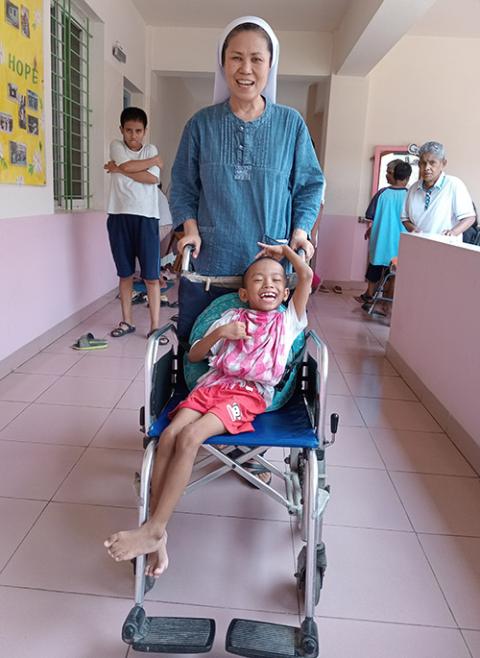
Members of Kkottongnae Sisters of Jesus in Bangladesh, their staff members and orphans are pictured at Kuchilabari in Gazipur, near Dhaka. (Sumon Corraya)
Since 2006, Kkottongnae Sisters of Jesus, missionaries from South Korea, have been serving orphans in Bangladesh in Kuchilabari in Gazipur, near Dhaka. The center's name is Kkottongnae House of Hope.
Kkottongnae is a Korean word meaning flower village. The congregation is part of the larger Kkottongnae Brothers and Sisters of Jesus founded by Korean Fr. John Oh Woong-Jin in 1976. Kkottongnae Sisters collect orphans from streets, rail stations and hospitals who are neglected and unloved and are familiar with police and hospital authorities. When anybody gets news about orphans who are ill and disabled, they inform the Kkottongnae Sisters.

Sr. Andree Lee, right, and Sr. Matthew Lee run Kkottongnae House of Hope in Gazipur. (Sumon Corraya)
South Korean national Sr. Andree Lee, assistant director of Kkottongnae Sisters in Bangladesh, told GSR that they obtain support from police and government officers. "We didn't take in any persons who have relatives, we only take such orphans who cannot run their lives alone and require others' support," said Lee. The Kkottongnae Brothers also work in Bangladesh with male orphans in the Mymensingh Diocese, 113 kilometers away from Dhaka.

Sr. Andree Lee with a disabled child at Kkottongnae House of Hope in Gazipur (Sumon Corraya)
There are about 4.8 million orphans in Bangladesh and the Kkottongnae Sisters' support brings hope to these vulnerable people. Recently, Global Sisters Report spoke to Lee, 52, about the sisters' work.
Global Sisters Report: What is the aim of the Kkottongnae Sisters of Jesus' ministry in Bangladesh?
Lee: We receive in this center those who don't have any relatives and they stay until their death as family members. As missionaries, we didn't come to Bangladesh from South Korea to help impoverished people, but have arrived in this country to love destitute orphans. We become their family members so that they can realize God's love. It is our charism. We don't take in the needy or persons with disabilities who have parents or siblings.
Who do you model your ministry after?
Our founder, Fr. John Oh Woong-Jin, one day followed Choi Gui Dong, who was a beggar and physically less able. But Choi was taking care of 18 other homeless, orphans and disabled people under a bridge with the income that he earned by begging. This incident touched Father John's heart. He understood this truth: "Even if you have only the strength to beg for food, it is the blessing of the Lord." He saw that if a disabled person can help many other people, why do we not help helpless people? This is how this congregation was started.

Sr. Andree Lee stands beside a statue of Choi Gui Dong at House of Hope in Gazipur. Choi lived in poverty and had a disability, but Choi took care of 18 other homeless, orphans and disabled people. The founder of Kkottongnae Sisters of Jesus was inspired by his story. (Sumon Corraya)
How do you provide services to orphan people?
We seek destitute orphans and people with disabilities. We clean them. We manage treatment for them. As Kkottongnae family members, we love them.
When we discovered a Muslim on the street, she was dirty and having mental health issues. We helped her get cleaned up. Another Muslim woman was also found on the streets of Dhaka. We found out she had studied at college, but then faced mental health issues. She lost her mother. She has an older sister who got married. We gave her medicine and gradually she is getting better. We enrolled her in our school. She can read and write.
We take care of all orphans as family members. Some of them were sexually persecuted and were drug addicts while they were on the street.
Advertisement
How do you provide them with entertainment?
We celebrate common birthdays once in a month. At that time, we provide special food and cake. Annually, we go to picnics with all the family members of our center. This year, in May, we went to the shrine of St. Anthony in Panjora of Gazipur. We have TV; once a day, they enjoy TV together. They attend indoor and outdoor games each day. Sometimes, we also conduct cultural programs, and many of them perform songs, acting and dance. They all enjoy it and have fun.

Sr. Andree Lee helps an orphan to wash his arm before lunch. (Sumon Corraya)
As a nun, how do you become a witness of Jesus Christ by serving orphans?
Honestly speaking, we never tell anybody to receive Christianity. All family members of our center attend prayer at 3 p.m. daily. Actually, most of them don't understand what religion is. Out of 18, merely five orphans are Christians. The rest are Muslims and Hindus.
Through our good and kind work, we become witnesses of Jesus Christ in this Muslim-majority country. Orphans say, "In the past we didn't have any person. Now we have family members. You pray for us. You love us and show your sympathy." They also love us immensely. By loving us, they also show their witness.

Sr. Matthew Lee feeds a person with a disability. (Sumon Corraya)
Do you face any challenges or threats?
We don't face any challenges or threats, but we get immense support for our good work. Sometimes police officials and local leaders come to us and ask us if we need any help. When we need any support, police and local leaders help us first. They admire our activity.
What is your future plan?
We want to extend our family in this country. If we get more orphans, we will establish more centers for them. From Korea, more missionaries will come to serve them and we will be witnesses of Jesus Christ. We have another plan. We want to start a formation house for our congregation.
Do you want to say anything else?
Besides serving in Kkottongnae House of Hope, we also serve hundreds of neglected people at the rail station twice a month. At that time, we provide treatment for those who are sick, and provide them food and clothes. Police help us there by providing security. We don't want anybody to die in the street without getting care and love. We want to inform neglected people that God has sent us to love them. We use our kind hands to clean them. We touch them with love, sympathy and dignity. We see their smile that gives us peace in our hearts.
In Korea, we have 220 nuns and 80 brothers. Gradually, the ministry of our congregation has increased as the number of orphans has increased across the world. We are serving in 19 countries.







